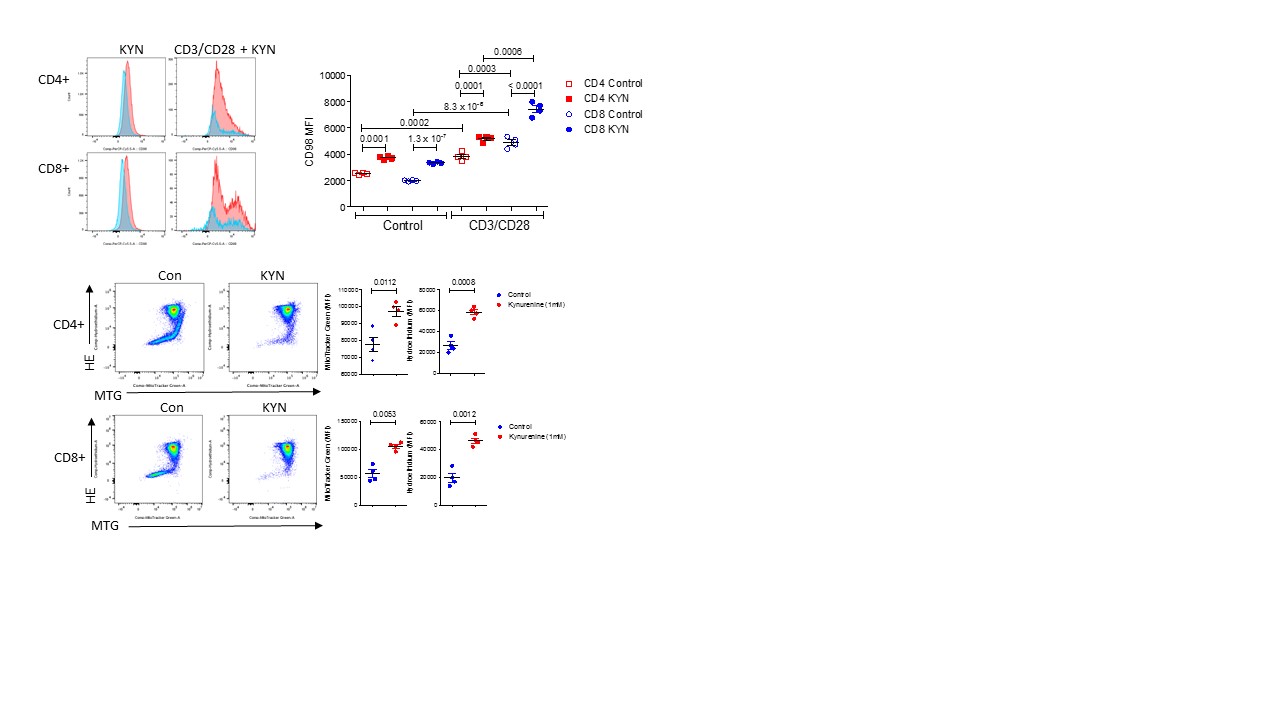Session Information
Date: Sunday, November 12, 2023
Title: (0066–0095) T Cell Biology & Targets in Autoimmune & Inflammatory Disease Poster
Session Type: Poster Session A
Session Time: 9:00AM-11:00AM
Background/Purpose: The kynurenine (KYN) pathway has been linked to disease pathogenesis in patients with systemic lupus erythematosus (SLE) (https://pubmed.ncbi.nlm.nih.gov/26366134/). Genetically enforced overexpression of Rab4A activates the mechanistic target of rapamycin in SLE patients (https://pubmed.ncbi.nlm.nih.gov/31805010/. The present study was initiated to determine the pro-inflammatory mechanism of action of KYN in lupus-prone SLE1.2.3 triple congenic mice on the C57Bl/6 background (B6.TC) carrying constitutively active Rab4AQ72L alleles (Rab4AKI) or lacking Rab4A in T cells (Rab4AKO).
Methods: KYN levels were measured within T cells and sera of mice carrying wild-type (WT), Rab4AKI and Rab4AKO alleles in female C57Bl/6 (B6) control mice and lupus-prone B6.TC mice using LC/MS. The effects of KYN on expression of its receptor CD98 and activation of mTOR complexes 1 (mTORC1, via pS6RP) and 2 (mTORC2, via pAkt) were studied by flow cytometry. Splenocytes were cultured in-vitro for 72 hours with or without KYN along with or without concurrent stimulation with lipopolysaccharide (LPS) or CD3/CD28. Mitochondrial mass and reactive oxygen species (ROS) were measured by flow cytometry using mitotracker Green (MTG) and hydroethidine (HE).
Results: KYN was accumulated in T cells and sera of B6.TC/Rab4AQ72L female mice that exhibited increased expression of CD98 and activation mTORC1 and mTORC2 relative to B6.TC and B6.TC/Rab4AKO controls. In C57Bl/6 splenocytes, KYN increased CD98 expression in CD4 and CD8 T cells (CD4 Unstim: FC=1.48, p=0.00012, CD8 Unstim: FC=1.68, p=2.1E-5, CD4 Stim: FC=1.36, p=0.00069, CD8 Stim: FC=1.51, p=0.00058) and significantly increased both mTORC1 (CD4 Unstim: FC=1.13, p=0.0169, CD4 Stim: FC=1.86, p=0.0086 CD8 Unstim: FC=1.24, p=0.0172, CD8 Stim: FC=1.49, p=0.0136) and mTORC2 (CD4 Unstim: FC=1.41, p=0.0003, CD4 Stim: FC=1.91, p=0.0018, CD8 Unstim: FC=1.42, p=0.0005, CD8 Stim: FC=1.55, p=0.0006). KYN increased mitochondrial mass (CD4 Stim: FC=1.25, p=0.0112, CD8 Stim: FC=1.87, p=0.0053) and ROS production (CD4 Stim: FC=2.2, p=0.0008, CD8 Stim: FC=2.34, p=0.0012) in both CD4 and CD8 T cells following KYN and CD3/CD28-stimulation.
KYN also expanded CD19+CD11c+ age-related B cells (ABCs) with or without LPS. KYN activated mTORC1 (CD19+: FC=1.15, p=0.012, ABCs: FC=1.97, p=0.0019) and mTORC2 (CD19+: FC=6.289, p=1.21E-5, ABCs: FC=3.70, p=0.00165) and CD98 expression (ABCs: FC=2.06, p=0.0144). Remarkably, the expression of CD138, a plasma cell marker, was also increased by concurrent LPS and KYN treatment (FC=2.76, p=0.001).
Conclusion: This study suggests that KYN accumulation in lupus-prone T cells causes a CD98-KYN-mTOR positive feedback loop which is enhanced by Rab4A activation, conferring secondary KYN-mediated expansion of ABCs and plasma cells. The Rab4A-CD98/mTOR/KYN positive feed-back loop may represent a mechanistic target for therapeutic intervention in SLE.
To cite this abstract in AMA style:
Winans T, Huang N, Lewis J, Wang X, Faludi T, Krakko D, Morel L, Perl A. Kynurenine Is a Proinflammatory Metabolite That Activates a Positive Feedback Loop of Rab4A-dependent CD98 Expression and mTORC1 and mTORC2 Activation in SLE [abstract]. Arthritis Rheumatol. 2023; 75 (suppl 9). https://acrabstracts.org/abstract/kynurenine-is-a-proinflammatory-metabolite-that-activates-a-positive-feedback-loop-of-rab4a-dependent-cd98-expression-and-mtorc1-and-mtorc2-activation-in-sle/. Accessed .
« Back to ACR Convergence 2023
ACR Meeting Abstracts - https://acrabstracts.org/abstract/kynurenine-is-a-proinflammatory-metabolite-that-activates-a-positive-feedback-loop-of-rab4a-dependent-cd98-expression-and-mtorc1-and-mtorc2-activation-in-sle/


